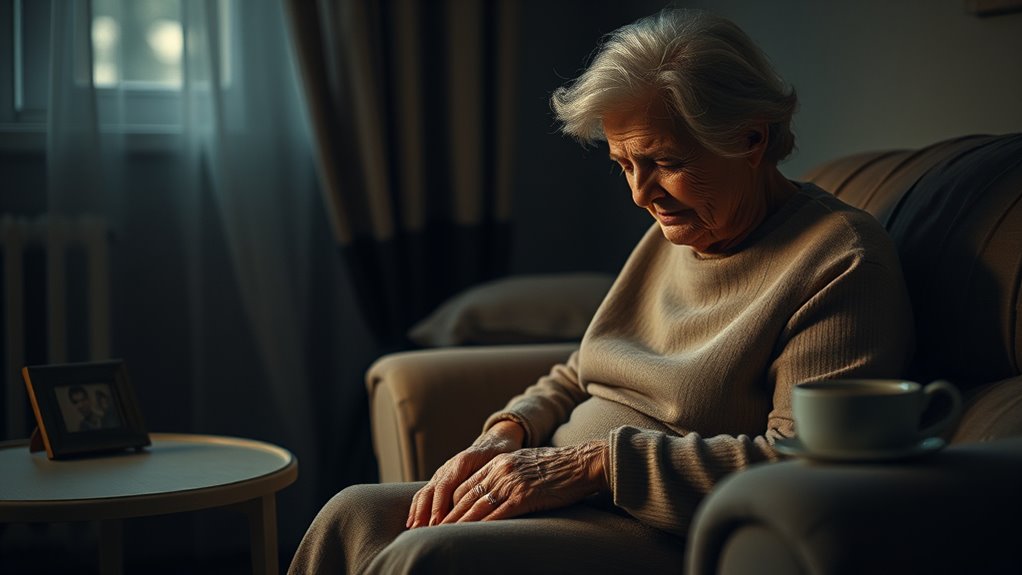To help an elderly loved one with depression, notice signs like social withdrawal, persistent sadness, or physical complaints that linger. Understand these may be mistaken for normal aging or health issues, so thorough assessment is key. Support them through social activities, emotional encouragement, and professional treatment like therapy or medication when needed. Utilizing technology and community services can also make a difference. Keep exploring these strategies to better support their mental health journey.
Key Takeaways
- Encourage social engagement, community activities, and volunteer opportunities to reduce isolation and boost mood.
- Seek professional mental health assessment for accurate diagnosis and personalized treatment options.
- Utilize AI-driven tools for continuous monitoring, early detection, and remote screening of depressive symptoms.
- Promote physical activity, healthy eating, and emotional support to improve overall well-being.
- Recognize warning signs of severe depression or suicidal thoughts and seek immediate professional help.
Recognizing Symptoms of Depression in Older Adults
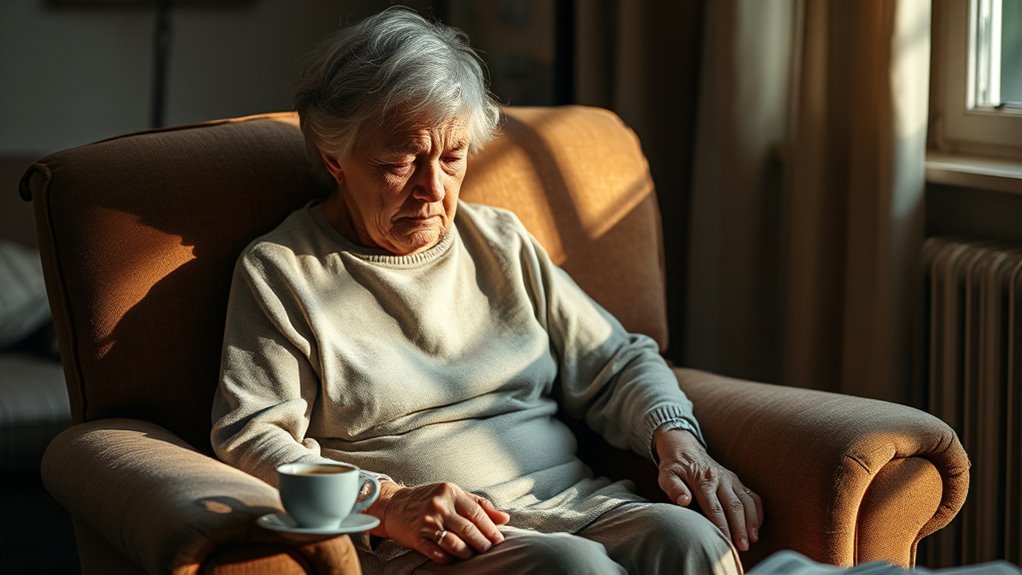
How can you recognize depression in older adults when symptoms often differ from those in younger people? Look for signs like physical complaints—aches, fatigue, or sleep disturbances—that might be mistaken for normal aging. Pay attention to a lack of energy, social withdrawal, and a loss of interest in activities they once enjoyed.
Changes in appetite can also signal depression, alongside mood-related features like feelings of worthlessness or persistent sadness. These symptoms may be subtle but tend to persist over time, making diagnosis challenging.
Older adults mightn’t display classic signs of depression, so recognizing these atypical depression symptoms is essential. Early identification helps ensure they receive the right treatment, improving their overall well-being and quality of life.
Differentiating Depression From Normal Aging and Other Conditions
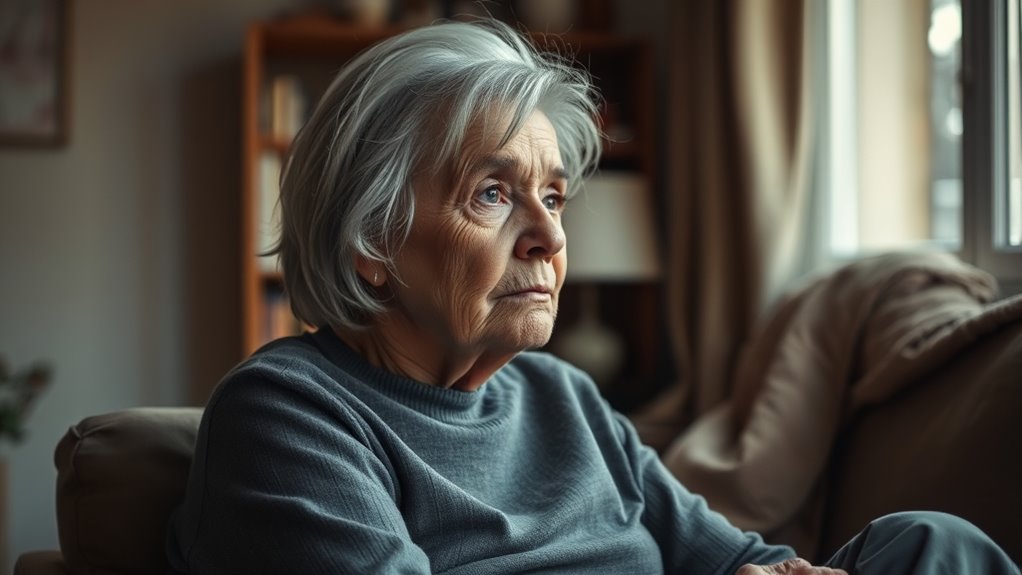
Recognizing depression in older adults can be complicated because its symptoms often resemble those of normal aging or other medical conditions. While mood fluctuations are common with normal aging, persistent feelings of hopelessness, guilt, or thoughts of death suggest depression in older adults. Physical symptoms like fatigue, weight loss, sleep disturbances, and slowed movements are common in depression but can also stem from other health issues or age-related changes, creating diagnostic challenges. Atypical presentation, such as cognitive impairment or somatic complaints without overt sadness, further complicates the differential diagnosis. Because of overlapping symptoms, a thorough mental health assessment is essential to accurately distinguish depression from normal aging or medical conditions, ensuring appropriate treatment and support. Understanding the role of cybersecurity vulnerabilities can also be important in safeguarding mental health resources and patient information in digital health environments. Additionally, being aware of recognition of symptoms can improve early detection and intervention for depression in the elderly. Recognizing subtle signs and understanding the differentiating factors between depression and other age-related issues can lead to better outcomes. Moreover, the use of diagnostic tools can aid clinicians in making more accurate assessments amidst symptom overlap. Incorporating comprehensive screening methods can further enhance diagnostic accuracy and ensure timely intervention.
Approaches to Supporting an Elderly Parent With Depression
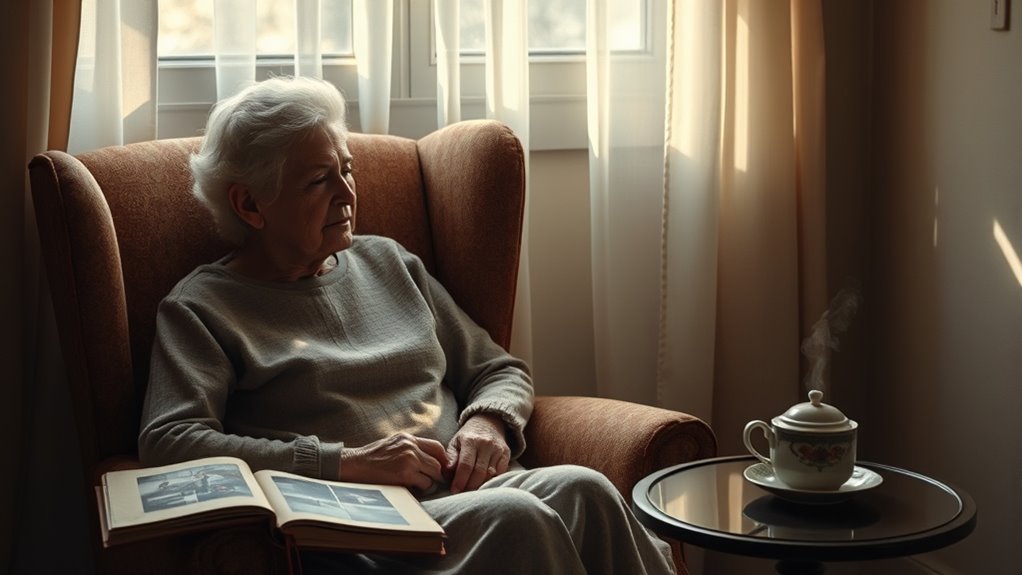
Supporting an elderly parent with depression involves a compassionate, proactive approach that fosters trust and promotes their well-being. To effectively support your elderly loved ones, consider these key strategies:
| Social Engagement | Emotional Support | Physical & Mental Health |
|---|---|---|
| Encourage community activities | Communicate with empathy | Promote physical activity |
| Support social connections | Respect autonomy in decision-making | Facilitate access to therapy |
| Volunteer opportunities | Foster open conversations | Encourage healthy eating habits |
| Reduce loneliness | Offer caregiver support | Focus on treatment options |
A comprehensive understanding of depression in the elderly can help tailor your support efforts more effectively. Additionally, exploring portable camping options such as tents and solar panels can provide comfort and independence during outdoor activities, which may positively impact mental health. Being aware of contrast ratio and its influence on visual clarity can also help in creating an environment that supports mental well-being. Planning for cost and budgeting considerations, such as potential expenses for medical care or home modifications, can also be beneficial for long-term stability.
Treatment Options and When to Seek Professional Help
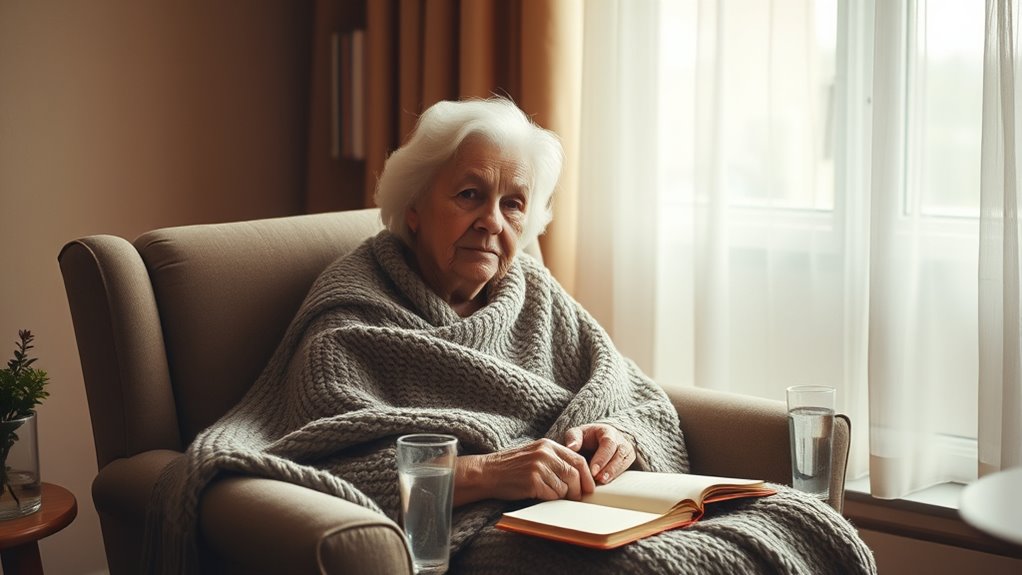
When caring for an elderly parent with depression, understanding when to seek professional help is essential. If they show persistent sadness, loss of interest, or suicidal thoughts lasting more than two weeks, it’s time to consult a mental health professional.
Treatment options for depression in the elderly often include therapy, such as cognitive-behavioral therapy (CBT), and antidepressants like SSRIs or SNRIs. Monitoring payment data protection and ensuring secure communication channels can also play a role in maintaining trust during treatment. Additionally, incorporating sound healing science techniques, such as listening to calming frequencies, may offer supplementary relief for some individuals. Recognizing divorce law differences may also be relevant, as significant life changes can impact mental health. Engaging in social support networks can provide emotional assistance and reduce feelings of isolation.
Early intervention can considerably improve outcomes, especially if symptoms interfere with daily life or worsen.
Combining medication with therapy and lifestyle changes tends to be most effective, but medications require careful monitoring for side effects.
Seek immediate help if your loved one exhibits signs of severe depression, including suicidal ideation or self-harm tendencies.
Addressing mental health concerns promptly ensures better support and recovery. Regularly consulting mental health professionals and being aware of appropriate treatment options can make a significant difference in managing depression effectively.
Self-Care Strategies for Caregivers and Community Resources

Caring for an elderly loved one with depression can be demanding, but practicing self-care is vital to maintain your own well-being. Prioritize mental health by engaging in mindfulness, breathing exercises, and taking regular rest to prevent burnout. Developing resilience through self-awareness can help you better manage caregiving challenges and maintain your emotional strength. Connecting with caregiver support and joining support groups can provide emotional relief, shared experiences, and practical advice, reducing stress and isolation. Utilize community resources like senior services, meal delivery, and transportation programs to ease your caregiving burden and improve your loved one’s quality of life. Incorporating proven self-care strategies such as regular physical activity and proper nutrition can significantly enhance your capacity to provide ongoing support. Maintaining a balanced routine that includes social engagement and respite care ensures your physical and emotional well-being. Additionally, embracing a growth mindset can help you adapt to caregiving stresses and discover new ways to cope effectively. Staying informed about AI safety vulnerabilities can also help you recognize signs of mental health decline or crisis in your loved one, enabling timely intervention. Furthermore, understanding how AI-driven tools can support mental health monitoring may offer additional avenues for early detection and assistance.
Frequently Asked Questions
How to Help an Elderly Person With Depression?
When you want to help an elderly person with depression, start by showing empathy and patience.
Encourage them to stay socially engaged and participate in activities they enjoy.
Gently observe for signs like withdrawal or changes in sleep, and suggest professional help when needed.
Create a positive, supportive environment, promote healthy habits, and offer consistent emotional support to boost their mood and overall well-being.
What Are the Signs of Depression in the Elderly?
You notice signs of depression in an elderly person when they lose interest in activities they once enjoyed, withdraw socially, and complain of physical issues like aches and fatigue.
Watch for sleep disturbances, changes in appetite, mood swings such as sadness or irritability, and cognitive shifts like forgetfulness.
Physical signs like weight loss, slowed movements, and neglect of personal care also point to depression.
Recognizing these signs helps in seeking timely help.
How Does Living With a Depressed Person Affect You?
Living with a depressed person can feel like carrying the world on your shoulders. You might experience constant emotional exhaustion, sleep issues, and irritability, making everyday life overwhelming.
The persistent sadness and withdrawal of your loved one can leave you feeling helpless, frustrated, and guilty. Over time, this emotional strain can lead to burnout, affecting your health and well-being.
It’s important to seek support and prioritize your own needs too.
How to Get Out of a Depressive Episode?
To get out of a depressive episode, start by engaging in regular physical activity like walking or gentle yoga to boost your mood.
Stay connected with friends or support groups to reduce loneliness.
Practice mindfulness and challenge negative thoughts to reframe your thinking.
Maintain a routine, get enough sleep, and eat a balanced diet.
Don’t hesitate to seek professional help, including therapy or medication, to support your recovery.
Conclusion
Remember, your presence is a warm light guiding your loved one through cloudy days. By recognizing the signs, supporting them with patience, and seeking professional help when needed, you can help lift their spirits like sunshine breaking through gray skies. Your care creates a safe haven where hope can bloom once more. Together, you can turn the shadows into moments of light, reminding them they’re never alone on this journey toward brighter days.
